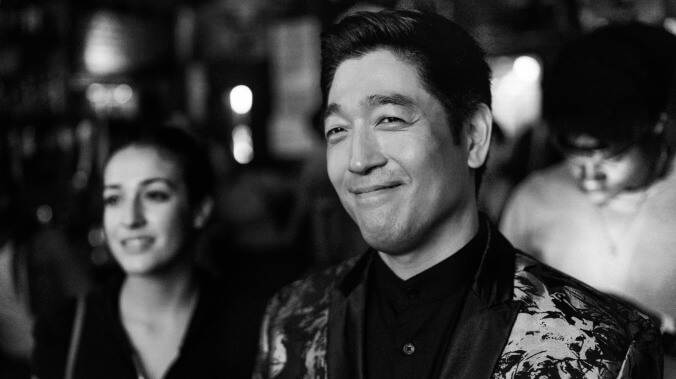With Harlem Ave., Radha must choose between two very recognizable paths: She can either workshop her play at a small Black theater space where she’ll be paid pennies, or she can submit to smarmy, Broadway-adjacent producer-slash-gatekeeper J. Whitman (Reed Birney), who will position her for wider success at the cost of her distinct voice. Each option is valid—full artistic control and a livable wage are both alluring in their respective ways—but having to sacrifice either isn’t exactly ideal. When a particularly condescending chat with Whitman ends in violence, Radha ostensibly destroys any chance at getting her show produced at all. This unintentionally uncovers a third, less conventional path: performing as a rapper who trades lyrics about ass-shaking for personal tales of sciatica pain and fatigue.
While her fictionalized self explores multiple facets of her creativity, Blank the actor and filmmaker exposes the unique heartbreaks of embattled marginalized artists. As a teacher, Radha is constantly judged by a younger generation for her stymied career. In the theater community, she’s a cautionary tale, an example of how refusing to compromise equates to certain obscurity. Even though her skills in a recording booth are unquestionable, she’s still an older Black woman in an industry that isn’t typically warm to female emcees, especially when they’re rapping about looming arthritis. Employing fierce wit and a verve befitting an artist desperate for survival, Blank cleverly and accurately captures the agony of working as a Black woman who dares to mine art from her own struggle. And though the real Blank was able to find her voice and audience as cabaret rapper RadhaMUSprime, Radha’s rocky pivot is relatable and appropriately offers no easy solutions.
As a director, Blank pays clear homage to classic New York noir. Spike Lee’s early work—more specifically, She’s Gotta Have It, the film that inspired the Netflix adaptation on which Blank worked—is a clear influence on Forty-Year-Old Version’s mostly black-and-white palette. In another Lee callback, Blank collects woman-on-the-street insights from Brooklyn locals, which further ground the work in its authentic homegrown charm. While it may sound wistful (and a little fashionable) to dub a work of art a “love letter” to something—especially when that something is New York City—Blank’s fondness for her Brooklyn roots is palpable in every lingering bridge shot, cheerful refrain from Radha’s students, and soliloquies from the brazen neighborhood fixtures bringing sage advice and colorful commentary in equal measure.
But Blank doesn’t simply re-create Lee’s vision. She improves upon it by getting to the core of each of her characters and elevating them beyond caricature. Much of that begins with her own. As Radha juggles her professional woes with the grief of losing her mother, Blank doesn’t hesitate to draw from her own experience with similar tragedy. (In fact, the artwork featured in the film is Blank’s late mother’s while some of the jazz music is her father’s.) She also strikes a natural rapport with the endearing Peter Kim, who plays Radha’s high school chum-turned-agent, Archie. His idea of success skews more toward the commercial, hence their proclivity to butt heads over her career. Still, Archie is guided by both his genuine love for Radha and an understanding of the biases that exist in commercial theater. Artistic autonomy is typically reserved for those who look like Whitman: older, connected white men. Radha’s and Archie’s opposing views on dealing with such gatekeepers mirror the crossroads that independent artists face without rendering the conversations heavy-handed.
There’s also Oswin Benjamin, offering an honest performance as young music producer D, who helps Radha lean into her potential as RadhaMUSprime. Though initially detached, D grows to respect and deeply care about Radha’s rap journey. His quiet tenderness adds welcome legitimacy to her creative evolution while she is otherwise surrounded by skeptics; the pair’s intimate but open-ended connection prevents the story from devolving into predictable romantic comedy tropes. Overall, The Forty-Year-Old Version shines with a sincerity that tends to elude other stories centering on starving artists. It doesn’t offer perfect solutions, only a brand of humor and astute wisdom one might from someone who has lived the life.

 Keep scrolling for more great stories.
Keep scrolling for more great stories.
